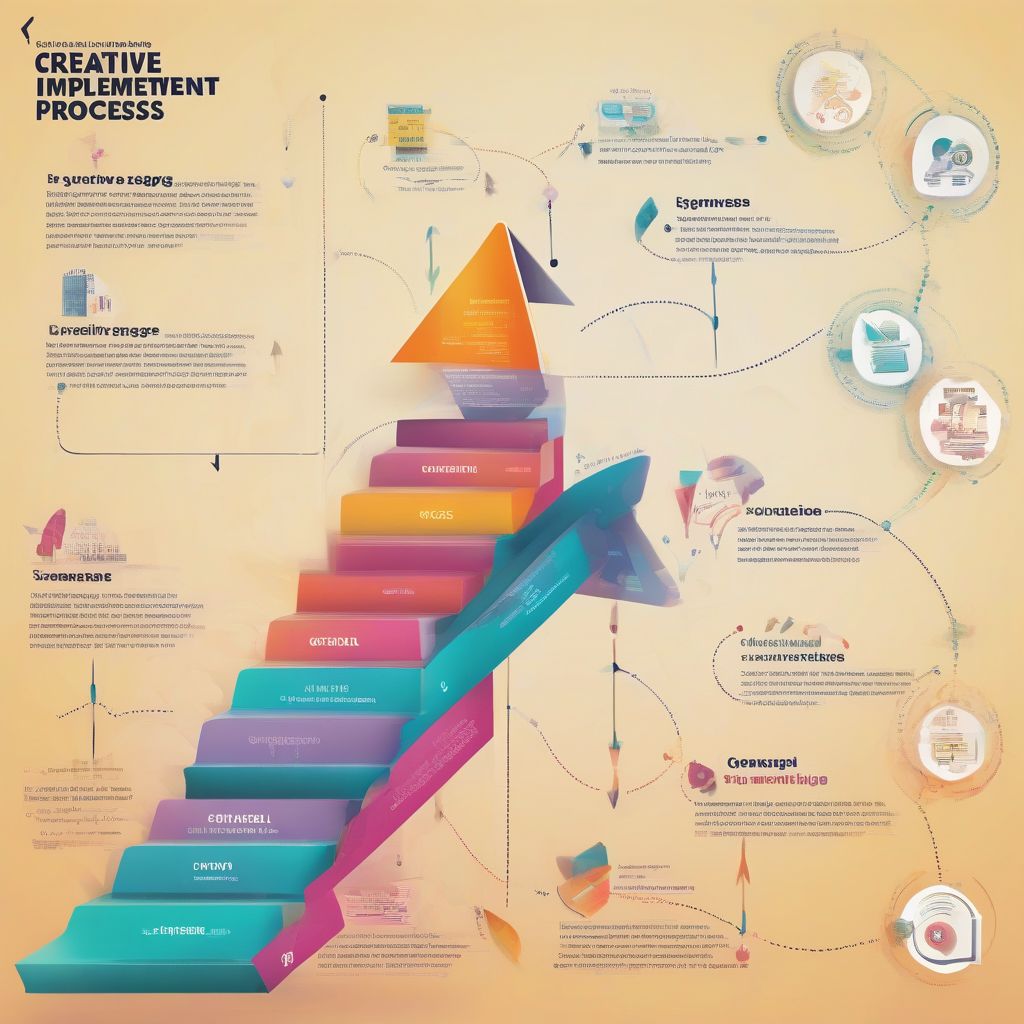Ever feel like you have a brilliant idea, but it never quite makes it off the ground? You’re not alone. Transforming a fleeting thought into a tangible creation is a journey, not a destination. This journey, the creative process, can be broken down into distinct stages, each with its own challenges and rewards. Understanding these stages – from initial concept to breakthrough execution – empowers you to navigate the creative landscape more effectively and consistently bring your ideas to life. Let’s dive in and unlock your creative potential.
Understanding the Creative Process
The creative process isn’t a linear path, but rather a cyclical one. It’s a dance between structured thinking and spontaneous inspiration, a blend of logic and imagination. Think of it as a recipe – you need the right ingredients and the right steps to bake the perfect cake. Similarly, understanding the stages of creativity allows you to harness your creative energy and avoid common pitfalls.
Stage 1: Preparation – Planting the Seeds of Inspiration
This stage is about immersing yourself in information, gathering inspiration, and defining the problem you want to solve. Like a gardener preparing the soil, you’re creating fertile ground for your ideas to sprout. This involves research, brainstorming, mind-mapping, and exploring different perspectives. Ask yourself: what problem am I trying to solve? What are the existing solutions? What could be done differently?
Stage 2: Incubation – Letting the Ideas Simmer
This stage is often overlooked, but it’s crucial. It’s about stepping away from the problem and letting your subconscious mind work its magic. Think of it like marinating a steak – the flavors develop over time. Engage in activities that relax and inspire you, such as walking in nature, listening to music, or meditating. This allows your mind to make new connections and generate fresh insights.
Stage 3: Illumination – The “Aha!” Moment
This is the exciting part – the moment of insight, the breakthrough idea. It can strike unexpectedly, like a lightning bolt of inspiration. Suddenly, the pieces of the puzzle fall into place, and you have a clear vision of your solution. This “aha!” moment is the culmination of the preparation and incubation stages.
Stage 4: Evaluation – Refining Your Idea
Now it’s time to put your idea to the test. Evaluate its feasibility, practicality, and potential impact. Does it solve the problem effectively? Is it innovative? Does it align with your goals? Seek feedback from trusted sources and be open to constructive criticism. This stage helps you refine your idea and make it stronger.
Stage 5: Elaboration – Bringing Your Idea to Life
This is where the rubber meets the road. It’s about transforming your idea into a tangible product or service. This stage involves planning, prototyping, experimenting, and iterating. It’s a process of refinement, where you continually improve and perfect your creation.
Stage 6: Implementation – Launching Your Creation into the World
This is the final stage, where you share your creation with the world. It’s about marketing, distribution, and getting your product or service into the hands of your target audience. This stage requires careful planning and execution to ensure a successful launch.
Practical Tips for Enhancing Creativity
- Embrace Failure: Don’t be afraid to experiment and make mistakes. Every failure is a learning opportunity. As Thomas Edison famously said, “I have not failed. I’ve just found 10,000 ways that won’t work.”
- Cultivate Curiosity: Ask questions, explore new ideas, and challenge assumptions. Curiosity is the fuel for creativity.
- Collaborate with Others: Sharing ideas and perspectives can spark new insights and lead to breakthrough innovations.
- Practice Regularly: Like any skill, creativity can be honed with practice. Set aside time each day to engage in creative activities.
- Embrace Mindfulness: Pay attention to the present moment and observe your thoughts and feelings without judgment. This can help you access your inner creativity.
 Stages of the Creative Process
Stages of the Creative Process
- Hardcover Book
- Jaouad, Suleika (Author)
- Stein Greenberg, Sarah (Author)
- English (Publication Language)
- Judkins, Rod (Author)
- English (Publication Language)
- Amazon Kindle Edition
- Fletcher, Angus (Author)
- Bowers, Ms. Jennifer (Author)
- English (Publication Language)
- 101 Essays That Will Change The Way You Think
- Wiest, Brianna (Author)
- The Original Creative Thinking Journal
- #1 Guided Journal for Creative Thinking (also check out our ALL Ages edition- 13 yrs and up-on Amazon)
- Kanelos Weiner, Jessie (Author)
- English (Publication Language)
- Jeremy Gutsche (Author)
- English (Publication Language)
The Power of Meal Prep in Fueling Creativity
As a nutritionist and meal prep coach, I’ve seen firsthand how proper nutrition can impact cognitive function and creativity. When you nourish your body with wholesome foods, you provide your brain with the fuel it needs to function optimally. Meal prepping allows you to consistently consume nutritious meals, eliminating the stress of last-minute meal decisions and freeing up mental space for creative pursuits.
Conclusion: Embracing the Journey of Creativity
The creative process is a journey of discovery, a dance between structure and spontaneity. By understanding the stages of creativity – from initial concept to breakthrough execution – you can unlock your creative potential and bring your ideas to life. Remember, creativity is not a fixed trait; it’s a skill that can be cultivated and nurtured with practice. So, embrace the journey, experiment, and watch your ideas flourish. Now, I’d love to hear from you! What are your biggest challenges in the creative process? Share your thoughts and experiences in the comments below. And don’t forget to share this article with your fellow creatives!










